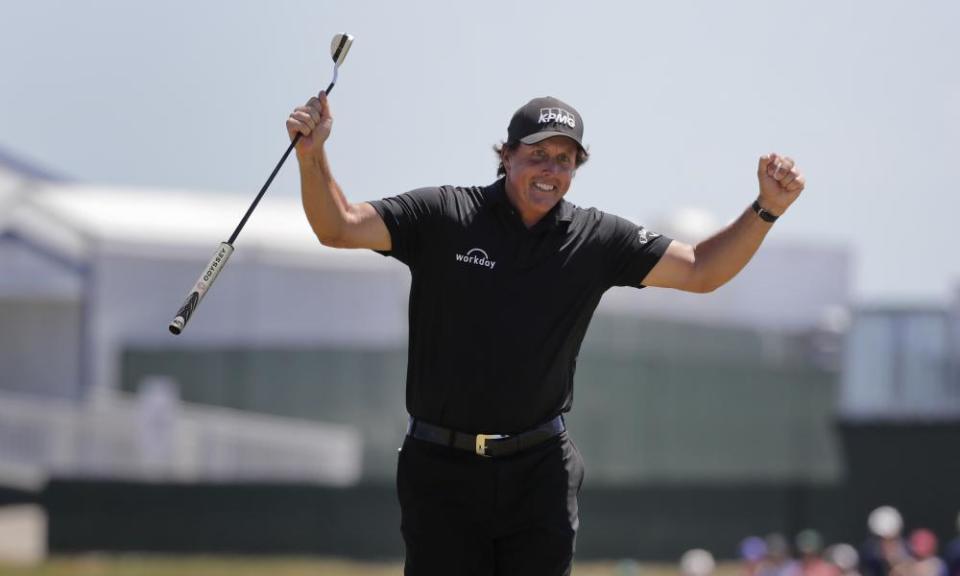Phil Mickelson’s mad moment may be a case of the US Open has got him beaten

Perhaps New York golf fans are not a particularly valid barometer. A day after players – most notably Ian Poulter – were verbally abused when going about their US Open business, Phil Mickelson stood with arms aloft having holed out for par on the 13th green. The masses roared with delight. “You’re the man, Phil.” Well, quite. The rest of us rolled our eyes.
That the United States Golf Association is acutely aware of Mickelson’s lauded status in the eyes of the public is highly significant in context of the tawdry events of Saturday. The USGA, fighting an apparently losing battle to win over hearts and minds, could not very well disqualify a golfing sweetheart from the only major he has not yet won. On his birthday? Immediately before Father’s Day? No chance. We will never know how the USGA would have reacted had Brian Harman or Sam Burns behaved in the same manner as Mickelson.
Mickelson’s antics on the 13th on Sunday, the scene of his deliberate breaching of golf’s rules on Saturday, suggested no lesson has been learned. That is the only available conclusion given he refused to conduct post-round interviews having seemingly autographed every available item of golf merchandise in New York state.
READ MORE: Reed on the charge as U.S. Open race hots up
READ MORE: Birthday boy Mickelson penalised for bizarrely hitting moving ball
READ MORE: Mickelson ‘didn’t mean to disrespect anybody’ by putting moving ball
Contrary to occasional interpretation, Mickelson did not use or bend those rules to his advantage. He broke them. Even more galling was the post‑round assertion after a sharp jog towards a woeful putt was entirely on purpose. That Mickelson is regarded in certain quarters as an unlikely villain does not at all excuse his petulance.
Mickelson had called Mike Davis, the USGA’s chief executive, on Saturday to apparently double check he should not have been disqualified. This is curious, given Mickelson had made such a point of being perfectly versed in what the rules say. Davis – who should carry a business card stating “In event of emergency, call a press conference” – not only had to justify leniency after round three ended, he issued a statement on Sunday morning. “There appears to be some continued uncertainty …” started this bulletin. On the contrary; people are certainly angry.
John Bodenhamer, the USGA’s rules guru, brushed aside the notion that disqualification should have been implemented under rule 33-7. “It’s used in extreme circumstances,” he said. If this was not an extreme circumstance, of a player wilfully breaking golf law before boasting about it, it is unclear what precisely is.
If golf takes a dim view of those who take the moral low ground, it should make no apology for that. Mickelson’s behaviour stood out because it was so brazen. Butter has not melted in his mouth in the past. Four years ago, he did not so much stab Tom Watson in the back as issue a withering critique of the USA’s Ryder Cup captain at Gleneagles as the veteran sat five seats away. It was duly put to Mickelson that he had “brutally destructed” Watson in front of the watching world. His response? “Oh, I’m sorry you are taking it that way.” Having the courage of his convictions, after all, might have damaged Mickelson’s halo.
The same applies here. Had Mickelson claimed his act was borne out of frustration on what was a brutal US Open day, he would have been afforded understanding. Had he claimed this represented a protest against the golf course setup as implemented by the USGA, Mickelson would have been in tune with his fellow competitors. Instead, the five-time major champion was at his supercilious worst.
One legitimate explanation for Mickelson’s dive into controversial waters is that he realises a career grand slam is an unattainable dream. With every passing year – and Shinnecock appealed to Mickelson more than most US Open venues – the chances of him winning this prestigious event recede. He has now reached 48, the age identical to that of Julius Boros when he became the oldest major winner in history. That was in 1968.
Mickelson’s fourth round of 69 meant an aggregate of 16-over par. Rickie Fowler, his playing partner, said the 13th on Saturday was an instant topic of conversation. Fowler, it must be noted, is not prone to critical sentiment towards anyone.
“He joked about it right as we went down the 1st hole,” Fowler said. “So we had a good time. And then he made a good par save on 13 and it looked like he won the Masters. He didn’t jump, but he had a little celebration there.
“Obviously, Phil’s great at enjoying playing golf, having fun out there, interacting with the fans. I feel like we both had a good time out there just enjoying a fun round of golf. We both had it going. Unfortunately Phil didn’t finish it off the way he wanted to.”
Mickelson’s exit was at great pace; an unedifying episode which rather summed up his week.

 Yahoo Sport
Yahoo Sport 





































